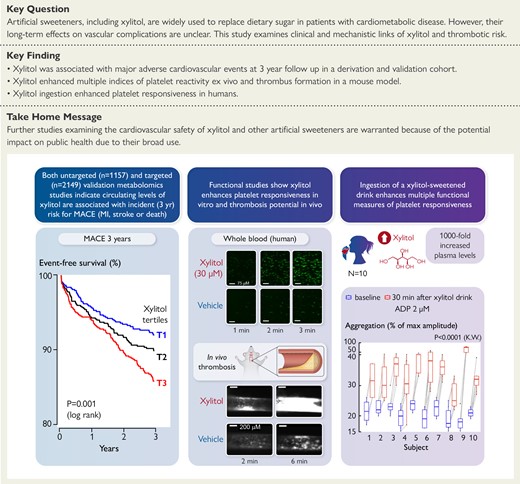博文
流行的无糖甜味剂与心脏病发作和中风有关
||
流行的无糖甜味剂与心脏病发作和中风有关
诸平
据美国俄亥俄州的克利夫兰诊所(Cleveland Clinic, 9500 Euclid Avenue, Cleveland, OH 44195, USA)2024年6月8日提供的消息,流行的无糖甜味剂与心脏病发作(Heart Attack)和中风(Stroke)有关(Warning: Popular Sugar-Free Sweetener Linked to Heart Attacks and Strokes)。克利夫兰诊所最近的一项研究表明,木糖醇(xylitol)含量高与心血管疾病风险增加有关,包括心脏病发作和中风。研究表明木糖醇可以增强凝血能力,从而增加血栓形成的风险。但是,对木糖醇消费的长期影响尚需要进一步的研究来进行评估。
根据克利夫兰诊所的研究,木糖醇含量高可能会促进凝血,从而增加心血管疾病的风险。木糖醇是一种常见的零卡路里甜味剂,存在于无糖糖果和牙膏中。克利夫兰诊所的研究人员发现,大量的糖醇木糖醇(sugar alcohol xylitol)与心脏病和中风等心血管疾病的风险增加有关。相关研究结果于2024年6月6日已经在《欧洲心脏杂志》(European Heart Journal)网站发表——Marco Witkowski, Ina Nemet, Xinmin S Li, Jennifer Wilcox, Marc Ferrell, Hassan Alamri, Nilaksh Gupta, Zeneng Wang, Wai Hong Wilson Tang, Stanley L Hazen. Xylitol is prothrombotic and associated with cardiovascular risk. European Heart Journal, 2024, ehae244. DOI: 10.1093/eurheartj/ehae244. Published: 06 June 2024.
参与此项研究的既有美国克利夫兰诊所勒纳研究所(Lerner Research Institute, Cleveland Clinic, 9500 Euclid Avenue, Cleveland, OH 44195, USA)的研究人员,也有来自克利夫兰诊所心脏,血管和胸腔研究所(Heart, Vascular and Thoracic Institute, Cleveland Clinic, 9500 Euclid Avenue, Cleveland, OH 44195, USA)的研究人员。此项研究由斯坦利·哈森(Stanley Hazen)医学博士领导,研究小组在大规模的患者分析、临床前研究模型和临床干预研究中证实了上述的这种联系。
木糖醇的流行和使用(Xylitol’s Prevalence and Use)
木糖醇是一种常见的糖替代品,用于无糖糖果、口香糖、烘焙食品和牙膏等口腔产品。在过去十年中,糖替代品的使用,包括糖醇和人工甜味剂,在被宣传为健康替代品(healthy alternatives)的加工食品中显著增加。
去年,同一个研究小组发现赤藓糖醇(erythritol)与心血管风险(erythritol and cardiovascular risk )之间存在类似的联系。在美国,木糖醇不像赤藓糖醇那样普遍存在于酮类或无糖食品中,但在其他国家很常见。
启示和建议(Implications and Recommendations)
克利夫兰诊所勒纳研究所心血管和代谢科学主席(Chair of Cardiovascular and Metabolic Sciences at Cleveland Clinic’s Lerner Research Institute)、心脏、血管和胸腔研究所预防心脏病科主任(Co-Section Head of Preventive Cardiology in the Heart, Vascular & Thoracic Institute)斯坦利·哈森博士说:“这项研究再次表明,迫切需要研究糖醇和人工甜味剂,特别是当它们继续被推荐用于对抗肥胖或糖尿病等疾病时。这并不意味着扔掉含有木糖醇的牙膏,但我们应该意识到,食用含有高浓度木糖醇的产品可能会增加患血栓相关疾病的风险。”
研究方法和初步发现(Study Methodology and Initial Findings)
在这项新的研究中,研究人员通过对美国和欧洲3000多名患者的分析发现,高水平的循环木糖醇与3年心血管事件风险升高有关。血浆中木糖醇含量最高的患者中有三分之一更有可能发生心血管事件。为了证实这一发现,研究小组进行了临床前测试,发现木糖醇会导致血小板凝结,增加血栓形成的风险。研究人员还追踪了摄入木糖醇甜味饮料和葡萄糖甜味饮料的人的血小板活动,发现在摄入木糖醇而不是葡萄糖甜味饮料后,凝血能力的每项指标都显著增加。
需要作进一步研究(Need for Further Research)
作者指出,评估木糖醇长期心血管安全性的进一步研究是有必要的。这项研究有一些局限性,包括临床观察研究表明了相关性,而不是因果关系。他们建议与应该与你的医生或认证营养师谈谈,了解更多关于健康食品的选择和个性化的建议。
这项研究是斯坦利·哈森博士正在进行的对剩余心血管风险(residual cardiovascular risk)因素调查的一部分。他的团队长期跟踪病人,发现血液中的化学特征,可以预测心脏和代谢疾病的未来发展。他在动脉粥样硬化和炎症性疾病研究方面有开创性的发现,包括将肠道微生物途径与心血管疾病和代谢疾病联系起来的开创性发现。斯坦利·哈森博士还指导克利夫兰诊所微生物组和人类健康中心(Cleveland Clinic’s Center for Microbiome and Human Health),并担任简·布利克斯马(Jan Bleeksma)血管细胞生物学和动脉粥样硬化主席(Jan Bleeksma Chair in Vascular Cell Biology and Atherosclerosis)。另外说明:斯坦利·哈森博士是克利夫兰诊所持有的关于心血管诊断和治疗的未决和已发布专利的共同发明人。
此项研究得到了美国国立卫生研究院( National Institutes of Health简称NIH)和膳食补充剂办公室(Office of Dietary Supplements)的部分支持。
上述介绍,仅供参考。欲了解更多信息,敬请注意浏览原文或者相关报道。
Background and Aims
The pathways and metabolites that contribute to residual cardiovascular disease risks are unclear. Low-calorie sweeteners are widely used sugar substitutes in processed foods with presumed health benefits. Many low-calorie sweeteners are sugar alcohols that also are produced endogenously, albeit at levels over 1000-fold lower than observed following consumption as a sugar substitute.
Methods
Untargeted metabolomics studies were performed on overnight fasting plasma samples in a discovery cohort (n = 1157) of sequential stable subjects undergoing elective diagnostic cardiac evaluations; subsequent stable isotope dilution liquid chromatography tandem mass spectrometry (LC-MS/MS) analyses were performed on an independent, non-overlapping validation cohort (n = 2149). Complementary isolated human platelet, platelet-rich plasma, whole blood, and animal model studies examined the effect of xylitol on platelet responsiveness and thrombus formation in vivo. Finally, an intervention study was performed to assess the effects of xylitol consumption on platelet function in healthy volunteers (n = 10).
Results
In initial untargeted metabolomics studies (discovery cohort), circulating levels of a polyol tentatively assigned as xylitol were associated with incident (3-year) major adverse cardiovascular event (MACE) risk. Subsequent stable isotope dilution LC-MS/MS analyses (validation cohort) specific for xylitol (and not its structural isomers) confirmed its association with incident MACE risk [third vs. first tertile adjusted hazard ratio (95% confidence interval), 1.57 (1.12–2.21), P < .01]. Complementary mechanistic studies showed xylitol-enhanced multiple indices of platelet reactivity and in vivo thrombosis formation at levels observed in fasting plasma. In interventional studies, consumption of a xylitol-sweetened drink markedly raised plasma levels and enhanced multiple functional measures of platelet responsiveness in all subjects.
Conclusions
Xylitol is associated with incident MACE risk. Moreover, xylitol both enhanced platelet reactivity and thrombosis potential in vivo. Further studies examining the cardiovascular safety of xylitol are warranted.
Role of the artificial sweetener xylitol in cardiovascular event risk. In initial untargeted metabolomics studies (discovery cohort) and subsequent stable isotope dilution liquid chromatography tandem mass spectrometry (LC-MS/MS) studies (validation cohort), fasting levels of xylitol are associated with incident major adverse cardiovascular events (MACE). Using human whole blood, platelet-rich plasma, and washed platelets, xylitol enhances multiple indices of platelet reactivity in vitro. Xylitol also was shown to enhance thrombosis formation in a murine arterial injury model in vivo. In human intervention studies, when subjects ingested a typical dietary amount of xylitol in an artificially sweetened food, multiple functional measures of platelet responsiveness were significantly increased. Xylitol is both clinically associated with cardiovascular event risks and mechanistically linked to enhanced platelet responsiveness and thrombosis potential in vivo. ADP, adenosine diphosphate; MI, myocardial infarction.
https://blog.sciencenet.cn/blog-212210-1437514.html
上一篇:中国的科学仍有发展的空间
下一篇:自旋秘密解锁:自旋电子学的新里程碑可能彻底改变电子学


